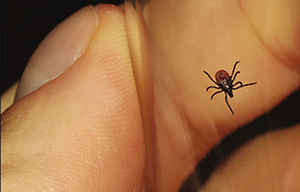 By Shelly Harris RN
By Shelly Harris RN
As we welcome the warmer weather and longer days of May, many of us are spending more time outdoors. Whether it’s a walk through Humber River trails, a visit to one of Emery’s many parks, or just playing in the backyard, the return of lush greenery also means the return of ticks.
Ticks are small, spider-like insects that feed on blood. Some species, such as the black-legged tick (commonly called the deer tick), can carry Lyme disease—a serious illness that affects both people and pets. As grass gets taller and trees fill in, ticks become more active, particularly in wooded and grassy areas.
For people, one of the best defences is awareness. If you’ve been out walking, hiking, or working in the garden, do a full body check when you return home, especially behind the knees, around the waistline, scalp, and underarms. Wear long sleeves and pants when possible and consider tucking your pants into your socks when hiking. Light-coloured clothing also makes it easier to spot ticks.
Lyme disease symptoms can appear days or even weeks after a bite and may include fatigue, joint pain, fever, or a bullseye-shaped rash. If you suspect a tick bite or notice these symptoms, speak with your healthcare provider right away. Early treatment is key.
But ticks aren’t just a human problem—our pets are at risk, too. Dogs, in particular, love romping through bushes and grass, and that’s exactly where ticks like to wait. Check your pet’s ears, neck, underbelly, and between their toes after outdoor time. Ticks can be hard to spot beneath fur, so regular grooming helps.
There are safe and effective tick prevention products available for pets, including topical treatments, collars, and chewable medications. Talk to your vet about what’s best for your furry friend based on their size, breed, and health history.
Ticks may be tiny, but they’re no small threat. Let’s enjoy the sunshine and the season—but take a few simple precautions to protect yourself and your pets.
Stay healthy, stay informed, and see you outside, Emery.

















